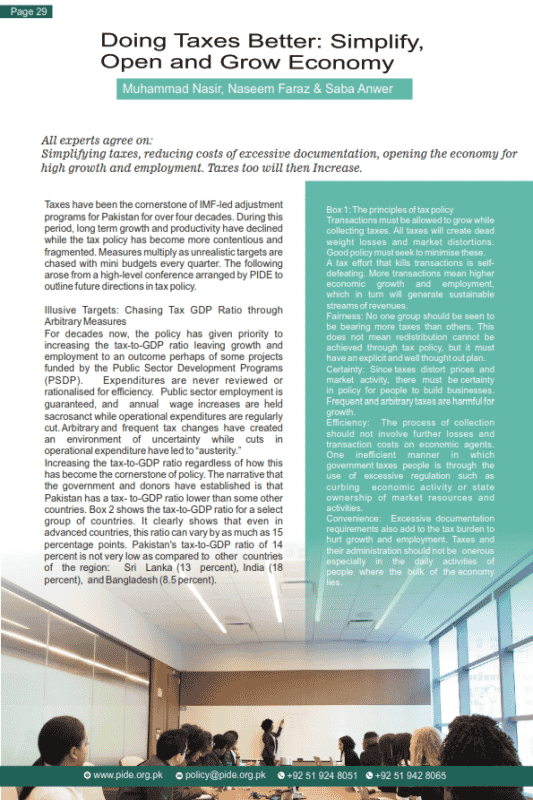Doing Taxes Better: Simplify, Open and Grow Economy (P & R Vol.1 Issue 3)
Taxes have been the cornerstone of IMF-led adjustment programs for Pakistan for over four decades. During this period, long term growth and productivity have declined while the tax policy has become more contentious and fragmented. Measures multiply as unrealistic targets are chased with mini budgets every quarter. The following arose from a high-level conference arranged by PIDE to outline future directions in tax policy.
Illusive Targets: Chasing Tax GDP Ratio through Arbitrary Measures For decades now, the policy has given priority to increasing the tax-to-GDP ratio leaving growth and employment to an outcome perhaps of some projects funded by the Public Sector Development Programs (PSDP). Expenditures are never reviewed or rationalised for efficiency. Public sector employment is guaranteed, and annual wage increases are held sacrosanct while operational expenditures are regularly cut. Arbitrary and frequent tax changes have created an environment of uncertainty while cuts in operational expenditure have led to “austerity.” Increasing the tax-to-GDP ratio regardless of how this has become the cornerstone of policy. The narrative that the government and donors have established is that Pakistan has a tax- to-GDP ratio lower than some other countries. Box 2 shows the tax-to-GDP ratio for a select group of countries. It clearly shows that even in advanced countries, this ratio can vary by as much as 15 percentage points. Pakistan’s tax-to-GDP ratio of 14 percent is not very low as compared to other countries of the region: Sri Lanka (13 percent), India (18 percent), and Bangladesh (8.5 percent).
| Box 1: The principles of tax policy Transactions must be allowed to grow while collecting taxes. All taxes will create dead weight losses and market distortions. Good policy must seek to minimise these. A tax effort that kills transactions is self- defeating. More transactions mean higher economic growth and employment, which in turn will generate sustainable streams of revenues. Fairness: No one group should be seen to be bearing more taxes than others. This does not mean redistribution cannot be achieved through tax policy, but it must have an explicit and well thought out plan. Certainty: Since taxes distort prices and market activity, there must be certainty in policy for people to build businesses. Frequent and arbitrary taxes are harmful for growth. Efficiency: The process of collection should not involve further losses and transaction costs on economic agents. One inefficient manner in which government taxes people is through the use of excessive regulation such as curbing economic activity or state ownership of market resources and activities. Convenience: Excessive documentation requirements also add to the tax burden to hurt growth and employment. Taxes and their administration should not be onerous especially in the daily activities of people where the bulk of the economy lies. |
Tax Policy is Killing Transactions Most experts are of the view that Pakistan’s tax policy is not based on well-known and clear principles (See Box 1). Section 5 of the Federal Board of Revenue Act legitimises a Tax Policy Board/Committee to sketch tax policy independent of FBR. Unfortunately, that board convened only once after reconstitution. The finance bills that continually add ad-hoc tax measures in frequent mini-budgets have developed a complex tax system that confounds the principles of rational tax policy.




